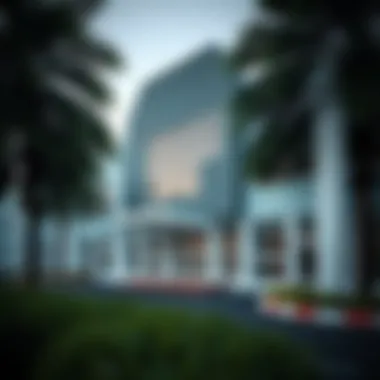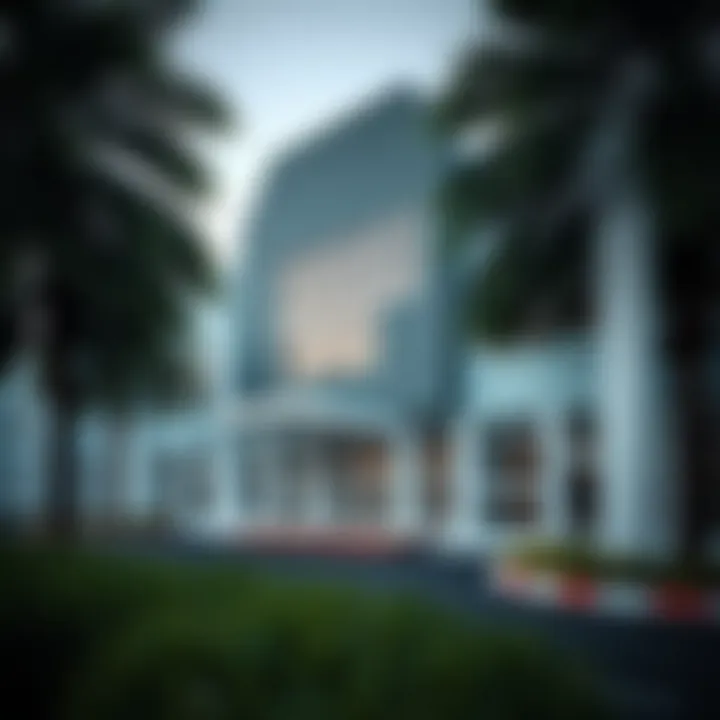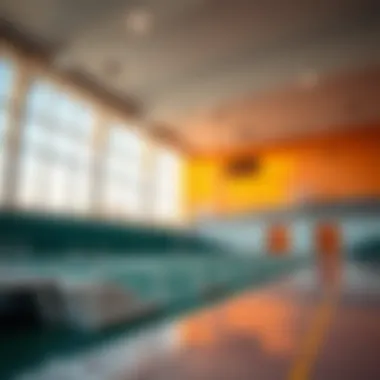Explore Schools in Al Nahda, Sharjah: A Detailed Guide


Intro
Al Nahda, a vibrant neighborhood in Sharjah, is more than just a residential area; it is evolving to become a hub of educational opportunities. The rapid development in this region has attracted families seeking quality education for their children. With numerous schools catering to a diverse population, each institution presents unique curriculums and pedagogical methods. However, the choice of a school goes beyond just its reputation; it involves understanding local demographics, community resources, and the overall educational landscape in the UAE.
As we embark on this comprehensive exploration of schools in Al Nahda, this guide will sift through the various choices available, dissect the educational philosophies, and pinpoint factors influencing school selection. By the end, parents and guardians will be equipped with the knowledge necessary to navigate this landscape, ensuring they can make well-informed decisions for their children's future.
In the following sections, we will delve into Market Trends, encapsulating both current analysis and future predictions, followed by Investment Opportunities, highlighting high-return areas and emerging neighborhoods within Al Nahda. Prepare yourself for an in-depth journey into Al Nahda's educational scene, uncovering not just the facts, but also the subtleties that make this neighborhood a significant player in the realm of education in the UAE.
Overview of Al Nahda, Sharjah
Al Nahda, located on the border between Sharjah and Dubai, represents more than just a residential area. It stands as a living tapestry of diverse cultures and burgeoning educational opportunities. This section provides a foundational understanding of Al Nahda, essential for anyone considering the educational landscape. A nuanced appreciation of its geographical, demographic, and economic facets allows parents, investors, and stakeholders alike to gauge the myriad impacts on schooling.
Geographical Context
Al Nahda is bounded by the vibrant areas of Al Qusais and Al Gulaya’a. This strategic placement draws attention not simply for its accessibility, but also for the way it interweaves the urban fabric of two major emirates. The community is characterized by its lush parks, bustling commercial centers, and residential neighborhoods that create an enriching environment for families. With easy access to major highways, commuting to various parts of Sharjah and Dubai unveils a realm of educational choices. The proximity to various amenities and transport facilities makes it a highly sought-after locale for families.
Key Points:
- Close to Dubai, making commuting manageable.
- Mix of urban life and green spaces for a balanced environment.
- Convenient transportation routes enhance accessibility to schools.
Demographics and Population Trends
The demographic landscape of Al Nahda is a melting pot. Here, residents hail from various countries, creating a lively and multicultural community. Current statistics indicate a steady influx of families seeking better educational prospects for their children. The young population signals an increasing demand for quality schools. As the area continues to grow, so does the necessity for educational institutions that cater to this diverse mix.
Important Considerations:
- Diverse population fosters a rich school environment.
- Increasing birth rates and migration trends create demand for schools.
- Cultural awareness in education becomes essential for schools in the region.
Economic Development and Its Impact on Education
Economic development in Al Nahda emphasizes a thriving local economy, reflected in its numerous businesses and retail sectors. As the area attracts more residents, evidenced by upscale malls and robust service industries, the demand for educational institutions naturally rises. Investors recognize this trend; thus, there has been an uptick in the establishment of both public and private schools. The synergy between economic growth and educational advancements not only helps meet the community's needs but also ensures that schools are equipped with modern facilities and capable teaching staff.
Considerations for Stakeholders:
- Rising economic indicators signal growth potential.
- Educational institutions are critical to sustaining economic expansion.
- Investment in schools can yield significant community returns.
Understanding Al Nahda's multilayered context lays the foundation for appreciating the educational opportunities it presents. Those seeking to engage with the local education sector will find valuable insights here.
Types of Schools in Al Nahda
In the vibrant neighborhood of Al Nahda, the educational landscape is not just diverse; it's a potpourri of options aimed at molding the future of young minds. Understanding the different types of schools available is paramount for parents navigating this crucial aspect of their children's upbringing. Each category comes with its unique flavor, catering to distinct educational philosophies and family needs. The right choice can pave the way for a child’s academic success, social development, and emotional well-being.
Public Schools
Public schools in Al Nahda offer education funded and regulated by the government, making them a go-to option for many families looking for a reliable education system. The curriculum adheres to the standards set by the UAE Ministry of Education, focusing primarily on the Emirati curriculum, which emphasizes both Arabic and Islamic studies alongside a well-rounded education.
Enrollment in public schools typically requires proof of residency and identity documents, but in return, families often find education to be accessible, allowing for a more financially manageable route compared to private schooling.
One of the significant benefits of public schools is their state-of-the-art facilities and resources. Many of these schools boast modern classrooms, science labs, and libraries that support diverse learning needs. Moreover, the social environment cultivates community bonds, bringing together children from varied backgrounds. Public schools can sometimes struggle with larger class sizes, but the government is actively focusing on improving teacher-to-student ratios.
Private Schools
Private schools in Al Nahda present a wealth of choices ranging from small, community-focused institutions to large international campuses. One of the biggest draws of private education is flexibility in curricula; parents can choose schools that align with their educational philosophy, whether that be a rigorous British system or a more relaxed alternative approach. They often feature smaller class sizes, which can lead to a more personalized learning experience for students.
Tuition fees for private schools can be substantial, reflecting the extended facilities, extracurricular activities, and specialized programs offered. However, many parents consider this investment worthwhile, as private schools provide opportunities for character building through various clubs and sports teams. Extracurricular opportunities can involve everything from robotics clubs to theater productions, enriching a child’s educational experience beyond just academics.
International Schools
International schools in Al Nahda are a melting pot of cultures, attracting expatriates from around the globe. These schools cater primarily to foreign nationals, offering internationally recognized curricula such as the IB, British, or American educational systems. This diversity not only enhances global perspectives among students but also equips them with skills fundamental for a globalized world.
While the tuition for international schools can be on the higher side, parents often appreciate the multicultural environment and broad opportunities for higher education worldwide. Many of these institutions place significant emphasis on English language proficiency, preparing students to excel in an increasingly interconnected global society. The classroom experience is often experiential, integrating technology in teaching, fostering critical thinking and creativity among students.
Curriculum Options Available
Exploring the curriculum options available in Al Nahda is vital for parents and guardians aiming to ensure their children receive the best educational experience possible. The region, with its rapid growth and cultural diversity, offers a range of curricula tailored to meet various educational philosophies and student needs. Understanding these options can directly influence a child’s academic path and future prospects.


Emirati Curriculum
The Emirati Curriculum is designed to reflect the heritage and values of the UAE while preparing students for a globalized world. It emphasizes core subjects such as Arabic, Islamic Studies, and the UAE national identity.
- Focus: It instills a sense of pride in Emirati culture and prepares students to contribute positively to their communities.
- Benefits: By integrating both local customs and modern educational practices, students develop a well-rounded understanding of their society. Furthermore, this curriculum often aligns with national assessments, ensuring students meet the educational standards set by the Ministry of Education.
This curriculum is a popular choice for families who wish to foster their children’s local identity while giving them a solid educational foundation.
IB Curriculum
The International Baccalaureate (IB) Curriculum is recognized globally and is highly regarded for its rigorous academic standards and holistic approach to education. Schools offering the IB curriculum often provide a diverse range of subjects, promoting critical thinking and intercultural understanding.
- International Recognition: An IB diploma is well-respected by universities worldwide, giving students an edge in higher education admissions.
- Skill Development: The program emphasizes inquiry and research, helping students develop essential life skills alongside academic knowledge.
- Community Impact: Through the Creativity, Activity, Service (CAS) component, students are encouraged to engage with their community, building social responsibility.
For parents considering the IB, it offers an excellent pathway not just academically but personally, inspiring learners to become active participants in their communities.
British Curriculum
The British Curriculum is structured around key stages, providing a clear educational framework that progresses from Foundation Stage through to A-Levels. One distinct feature is its breadth, covering subjects from the arts to sciences.
- Recognition: Globally recognized, it prepares students for UK universities and other institutions worldwide.
- Flexibility: Students can specialize at various stages, allowing them to delve deeper into subjects of interest, particularly in upper secondary.
- Rigorous Assessments: With a strong emphasis on examinations, the curriculum encourages students to develop a strong work ethic and time management skills.
Parents often choose the British Curriculum for its focus on academic excellence and its international recognition, which can benefit students wishing to further their education abroad.
American Curriculum
The American Curriculum is widely used in international schools in Al Nahda, characterized by a flexible, student-centered approach to education. It typically comprises a comprehensive range of subjects and a focus on critical thinking.
- Credit System: Students often earn credits toward high school graduation, with choices allowing them to explore a variety of courses.
- College Preparation: The curriculum includes Advanced Placement (AP) courses, which offer college-level classes while still in high school, enabling students to earn college credit.
- Focus on Skills: An emphasis on extracurricular activities is present, shaping well-rounded individuals adept in areas beyond academics.
For families looking towards studying in the USA or those wanting a curriculum that encourages creativity and independence, the American approach can be exceptionally appealing.
Admissions Process
Understanding the admissions process is crucial when selecting a school in Al Nahda, Sharjah. The landscape of education has become increasingly competitive, making it imperative for parents to be well-informed about the steps involved. A smooth admissions journey not only sets the tone for a child’s educational experience but also gives parents peace of mind as they navigate the myriad of choices available.
The process can differ significantly based on the type of school. Public schools generally have more rigid requirements set by the government, whereas private and international schools might offer a bit more flexibility. Knowing the specific requirements helps in preparing your child and alleviating stress during this critical period.
Moreover, paying attention to the application timeline is essential, as some institutions may fill their seats within weeks, while others may have longer enrollment periods. For families looking to secure a spot in a sought-after school, being aware of these deadlines can significantly affect their options and choices.
"Being prepared is key! Understanding the admissions process ensures that you don't miss out on opportunities for your child's education in Al Nahda."
Requirements for Different Types of Schools
When it comes to admissions, each school type has its own set of expectations. Here’s an overview:
- Public Schools:
Typically require residency documents, birth certificates, vaccination records, and possibly previous school records. The government might also stipulate certain eligibility criteria based on age. - Private Schools:
They may require additional documentation, such as recommendation letters, personal statements, and sometimes an entrance exam. Some private institutions also perform interviews with students and/or parents to gauge suitability. - International Schools:
Usually, these schools look for an array of documents including prior academic records, proficiency in English, and sometimes assessments based on standardized tests. Extracurricular achievements can also play a role in the admissions decision.
Key Dates and Deadlines
Timeliness can make or break your child's admission into a desired institution. Here are common dates parents should be aware of:
- Application Openings:
Most schools start accepting applications anywhere from six months to a year before the school year begins. Being aware of the official start dates will help you plan your application strategy. - Application Deadlines:
Schools often set strict cut-off dates for submitting applications. This can vary remarkably between school types; therefore, tracking each institution’s specific timeline will aid in ensuring that you're not caught off guard. - Admission Testing Dates:
If tests or interviews are part of the admissions process, knowing these dates ahead of time allows for proper preparation.
Successful Application Tips
Navigating school admissions can feel like walking a tightrope, but it's not impossible. Here are practical tips for ensuring your application stands out:
- Start Early:
The early bird gets the worm. Begin assembling your documents, preparing your child for interviews, and researching schools well in advance. - Craft a Strong Personal Statement:
Personal statements can set your application apart from others. Use this opportunity to articulate your child’s uniqueness and how the school aligns with your educational values. - Visit the Schools:
Many schools offer open days. These visits can provide insight into whether the school's culture aligns with your expectations. This also shows schools that you are interested and engaged. - Network:
Connect with other parents and educators to seek advice or testimonials about specific schools. This can provide invaluable insights that may not be listed in brochures.
By understanding the admissions process in-depth, parents can make well-formed choices that not only benefit their children but also reflect their educational goals and ambitions.
For more detailed information on school options, you can visit Wikipedia on Education in the UAE or explore community forums at Reddit for insights from parents in the area.
Facilities and Resources


The facilities and resources available in schools play a pivotal role in shaping the educational experience of students. In Al Nahda, where the urban landscape is continuously evolving, understanding the types of resources available can greatly help parents and guardians in making educated choices about their children's education. A well-equipped school can greatly enhance learning outcomes by providing an environment conducive to both academic and personal growth.
Classroom Environment and Learning Spaces
A structured classroom environment is crucial for fostering a positive learning experience. Schools in Al Nahda invest significantly in their classrooms, often designed to promote engagement and collaboration among students. Instead of the traditional rows of desks, many schools now favor flexible seating arrangements that allow students to work in groups and interact more freely. Large windows letting in natural light are common; they can help create a warm and inviting atmosphere, which can contribute to better focus and morale.
Moreover, learning spaces are often multi-functional. Libraries are reimagined as learning hubs where students can access technology, books, and guidance from educators. This not only encourages a love for reading but also fosters research skills critical in today’s information-rich world.
Extracurricular Activities Offered
Extracurricular activities are the icing on the cake when it comes to holistic education. In Al Nahda, schools recognize this and strive to offer a range of opportunities, from sports to arts and community service. Not only do these activities help in developing new skills, they also facilitate teamwork and social interaction among peers.
Engagement in extracurriculars can result in improved self-esteem and a sense of belonging within school communities. Activities like soccer, drama clubs, and science fairs are just a few options available to students. These programs are designed to complement the core curriculum, ensuring that students are well-rounded individuals ready to take on future challenges.
Technology Integration in Schools
In an age where technology is an integral part of life, schools in Al Nahda are leading the charge in incorporating modern tools into the learning process. Smartboards, tablets, and educational software are just some of the technological resources that facilitate a more interactive learning experience. This not only caters to diverse learning styles but also prepares students for a tech-centric job market.
Furthermore, schools often offer dedicated STEM programs that encourage critical thinking and problem-solving skills through hands-on projects. The embrace of technology in education is not merely about keeping pace with trends; it’s about enriching the learning experience and equipping students with the necessary skills to thrive in a competitive environment.
"Investing in quality facilities and resources is an investment in our children's future. Schools in Al Nahda are not just places to learn; they are communities that nurture the growth of the next generation."
By considering the facilities and resources, parents can gain insights into how a school aligns with their educational priorities. The environment, extracurricular options, and technology integration are not just supplementary but are fundamental in crafting an enriching educational landscape in Al Nahda.
Building Reputation and Community Feedback
In the intricate mesh of educational choices, the reputation of schools stands tall as a pillar of reassurance for parents. In Al Nahda, Sharjah, understanding how schools build and maintain their reputations offers insight into the choices available for families. The feedback from the community reflects the school’s performance, its inclusiveness, and its ability to foster an engaging learning environment.
When choosing a school, parents often rely on word-of-mouth referrals from friends or neighbors. The reputation established by a school through its accomplishments, methodologies, and the overall satisfaction of its students' families speaks volumes. Schools that actively seek feedback and demonstrate responsiveness to it can create a cycle of trust and confidence; parents feel more inclined to enroll their children if they hear glowing reviews about the school’s atmosphere and the academic opportunities it offers.
School Ratings and Reviews
Today, various platforms provide ratings and reviews of schools, offering a snapshot of what to expect. Websites like GreatSchools.org and SchoolDigger.com can give a succinct overview based on standardized test scores and public feedback. Parents can also look to local forums on Reddit or Facebook, where discussions can provide a nuanced view of day-to-day life in these educational establishments.
Generally, reviews can highlight key aspects:
- Academics: Insights into the efficacy of the teaching staff and curriculum offerings are of primary concern for many parents.
- Facilities: Reviews often detail the state and quality of school infrastructure.
- Teacher Support: Existing parents usually comment on how supportive and approachable teachers are, influencing potential students’ learning experiences.
Parent-Teacher Associations
Active Parent-Teacher Associations (PTAs) play a vital role in enhancing school-community communication. In Al Nahda, PTAs serve as a bridge between parents and school administrators, allowing for voicing concerns and celebrating achievements.
PTAs are particularly helpful for parents wanting to engage with school activities. They often lead initiatives aiming to develop school culture and actively involve parents in educational events. Some benefits of strong PTAs include:
- Enhanced collaboration between home and school, ensuring that parents have a say in their children’s education.
- Organizing events that foster community spirit, such as family nights, fundraising, and educational workshops.
A well-functioning PTA can significantly enhance a school's reputation, showcasing a commitment to collaboration and drawing in parents who appreciate such efforts.
Community Involvement in Education
Community involvement extends beyond PTAs; it encompasses a wide range of support from local businesses and organizations. Schools that engage with their communities can lead to enriched educational experiences by offering resources for extracurricular activities, mentorship opportunities, or internships.
Some points worth noting include:
- Local businesses often provide sponsorship for school events, making it easier for schools to host well-rounded programs.
- Cooperation between schools and community agencies can facilitate student engagement in projects that require practical input, such as environmental initiatives or cultural celebrations.
The participation of the community in a school’s activities not only fosters a sense of belonging but also enriches the educational landscape in Al Nahda, making it a nurturing place for students to thrive.
"A school isn’t just a building; it’s the community that surrounds it, shaping and sharpening the minds of the future."
Through understanding these facets of reputation and community feedback, parents can navigate the complex landscape of school choices in Al Nahda with confidence.
Economic Considerations
Understanding the economic implications of schooling options is a key part of choosing the right educational institution for children in Al Nahda. In a rapidly developing region where educational quality and accessibility are ever-changing, navigating through the financial aspects can often feel like walking a tightrope for parents and guardians. Whether contemplating public, private, or international schools, families must engage with various economic factors, encompassing tuition fees, financial aid opportunities, and overall living costs to make informed assessments.


Tuition Fees Overview
Tuition fees represent a significant consideration for families looking to enroll their children in schools across Al Nahda. Depending on the type of school—public schools are generally funded by the government, while private and international institutions often charge for their services—these fees can fluctuate widely. In general, tuition in Al Nahda can range anywhere from a few thousand dirhams to over sixty thousand dirhams annually, depending on the school’s reputation, facilities, and curriculum offerings.
While public schools offer free access to UAE nationals, expats need to examine private or international options, which usually come with a price tag, pushing many families to plan their budgets carefully. The components of tuition can also include additional costs, like registration fees, books, and extracurricular activities, adding layers to the overall expenditure.
Financial Aid Options
In a region where competition for quality education is high, many schools provide financial aid or scholarships. Aid opportunities vary, often depending on factors like merit, financial need, or specific talents in academics or sports. When considering a school, it is advisable to inquire about available financial assistance programs to see if they could significantly alleviate some of the tuition burden.
Some schools have formal scholarship applications available through their websites, while others may announce them upon request at open houses or introductory meetings. Furthermore, awareness of local government initiatives aimed at supporting families can also be beneficial. Education-focused grants, scholarships, or subsidies could help families secure better educational opportunities without excessive financial strain.
Cost of Living Implications for Families
The cost of living in Al Nahda has its own unique dynamics that can affect educational choices. School fees are just one piece of the puzzle; families also need to think about housing, transportation, and daily expenses when evaluating how much they can realistically allocate toward education. Housing costs can vary considerably, depending on proximity to schools and overall neighborhood desirability.
For instance, living closer to larger international schools typically demands higher rents, while more affordable housing options might be found farther away, resulting in additional transportation costs. Families should assess whether the convenience of a nearby school outweighs the potential savings from living further from a pricier institution.
"When choosing a school, it's not just about the tuition, but finding a balance between school quality, family income, and cost of living—treading carefully can lead to better long-term outcomes."
In essence, each family’s financial situation is not a straight line but instead a complex web that ties education, accommodation, and general cost of living into one comprehensive decision-making tapestry. By understanding these economic considerations, families are better positioned to navigate the educational landscape in Al Nahda, ensuring that their investments yield the best possible returns for their children's futures.
Career Pathways Post Graduation
Understanding career pathways after graduation is paramount, especially in a dynamic region like Al Nahda, Sharjah. The educational landscape contributes greatly to shaping the future of students. Thus, having a grasp on the various avenues open to graduates can significantly influence their choices during school years.
Higher Education Opportunities
The importance of higher education cannot be overstated. Students from Al Nahda have access to numerous universities and colleges, both locally and abroad. Many institutions provide programs in emerging fields such as technology, healthcare, and business. One notable aspect is how international collaborations can enrich educational offerings.
- Local University Options: Al Nahda has universities like the University of Sharjah, known for its diverse programs. Studying closer to home offers the benefit of familiar environments and communities.
- Study Abroad Programs: Various schools encourage student exchanges or partnerships with overseas institutions. This experience can enhance independence and global awareness.
- Scholarships and Grants: Scholarships are often available, helping ease the financial burden for families. It's wise for students to research these options early on.
In addition to academic growth, studying in varied settings fosters personal development, helping students become more adaptable to the workforce.
Vocational Training and Alternatives
Not every student opts for traditional university routes. Vocational training programs provide practical skills that are in high demand. These alternatives often require less time to complete than a bachelor's degree, allowing students to enter the workforce sooner.
- Hands-On Learning: Vocational programs often involve apprenticeships or internships. This real-world experience is invaluable, helping students to build networks and gain practical skills.
- Diverse Career Options: Fields such as culinary arts, information technology, and healthcare are increasingly relying on skilled trades.
- Access to Short Courses: Many institutions offer short courses, giving students the chance to enhance their knowledge in a specific area without a long-term commitment.
Graduates pursuing vocational training often report satisfaction with their jobs due to the immediate applicability of what they’ve learned. In many cases, these paths lead to lucrative and fulfilling careers, aligning well with market demands.
"The right education can act as a springboard into the future, ensuring students are well-prepared for their career choices and professional lives."
Future Trends in Education
The landscape of education in Al Nahda, Sharjah, is evolving rapidly, driven by a confluence of technological advancements, changing socio-economic factors, and shifts in student demographics. Understanding these future trends is crucial for stakeholders including investors, agents, and educators. It addresses the necessity for adaptability in education systems and promotes an enriching environment for students.
Impact of Technology on Learning
As technology permeates every aspect of life, its influence reaches the classroom like a tidal wave. Interactive learning environments, powered by digital tools, are becoming standard rather than the exception. Schools are increasingly adopting platforms that facilitate
- E-learning modules: These allow students to learn at their own pace and revisit materials, filling gaps in understanding.
- Virtual classrooms: With platforms like Zoom or Microsoft Teams, students can interact with peers and educators without geographical limitations.
- Gamification of education: Integrating game elements into learning provides engagement and motivation, particularly for younger learners. Research suggests that students show profound improvements in retention and comprehension when they are engaged through these innovative methods.
This surge in technology enhances collaboration, critical thinking, and creativity among students. However, it is essential to consider equitable access to these resources, as disparities can lead to unequal learning experiences.
Changes in Curricular Focus
In response to the demand for relevant skills in the workforce, educational curricula are shifting from a purely academic focus to include practical skills. Schools in Al Nahda are recognizing the need to equip students not only with knowledge but also with essential skills such as:
- Critical thinking and problem-solving: Emphasizing real-world applications.
- Digital literacy: Making students fluent in using technology effectively.
- Soft skills: Such as teamwork, communication, and adaptability which are highly valued by employers.
Moreover, some institutions have begun integrating a greater emphasis on sustainability and global citizenship, preparing students to tackle the challenges in their communities and beyond. This holistic approach may serve as a foundation for lifelong learning and civic responsibility.
Predicted Changes in Demographics
Demographic shifts are expected to influence the landscape of education in Al Nahda in significant ways. The area's population is projected to continue diversifying, bringing a mix of cultural backgrounds into the classroom. This diversity presents both opportunities and challenges for educators.
Factors to consider include:
- Multilingual classrooms: Educators will need to adapt teaching methods to cater to non-native speakers, ensuring inclusion.
- Increased international families: As Al Nahda attracts expats, international and bilingual schools may see a rise in enrollment, creating a need for relevant educational offerings.
- A focus on special educational needs: With greater awareness and acceptance of disabilities, schools will likely enhance their support services, providing tailored resources for all learners.
These predicted changes call for flexibility and innovation in schools, ensuring that all students receive a quality education, regardless of their background. Together, these trends indicate a shifting paradigm in the educational sector of Al Nahda, aimed at fostering inclusive, forward-looking learning environments.











